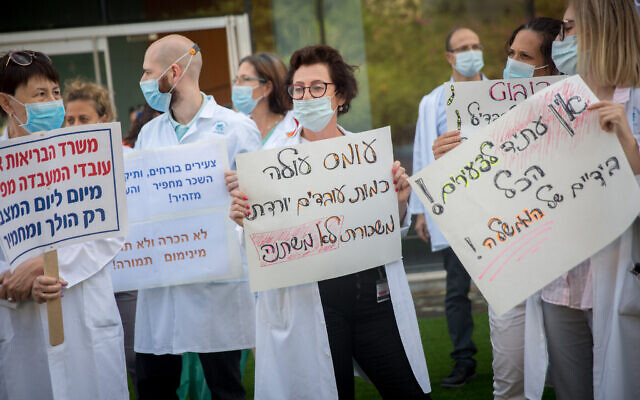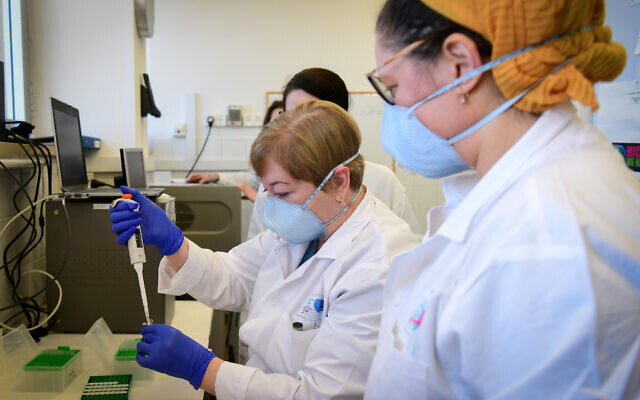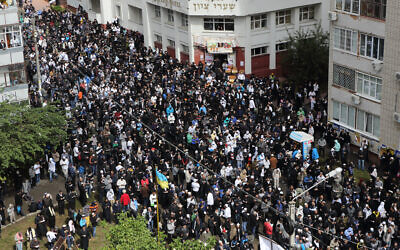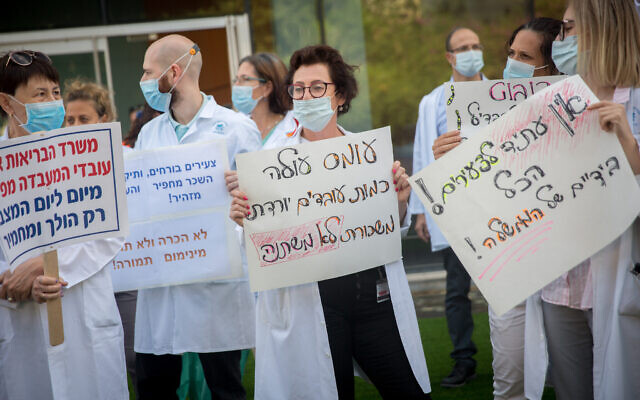Around 2,000 laboratory workers at some 400 public medical labs started an open-ended strike on Sunday morning amid a pay dispute with the treasury.
Coronavirus testing will continue amid the labor action, but only those who test positive will be notified so that epidemiological surveys can be carried out. Those who test negative for COVID-19 will not be updated.
However, the head of the union of biochemists and laboratory workers, Esther Admon, threatened that if there was no progress by late Sunday, they would also stop notifying individuals who were carriers of the virus.
“If they do not bring an attractive offer by the end of the day there will be no positive [test] results for coronavirus,” she told the Kan public broadcaster.
Health Ministry Director General Chezy Levy on Sunday morning chided the lab workers over the strike.
“I respect the lab workers, but you don’t go on strike in the middle of a war. I hope it ends today,” he told Army Radio.

Head of the Union of Biochemists and Laboratory workers, Esther Admon, June 11, 2020 (Screen grab/Ynet)
It was unclear if the labs could be compelled to give out positive results given the possible damage during a public health crisis.
During the strike, workers at public laboratories will only provide emergency diagnostic services to public hospitals. Channel 13 news reported that this would cover those only in departments such as intensive care, the emergency room and women giving birth.
Tests will not be processed for patients awaiting release from hospital, or for those awaiting non-essential surgery.
It was expected that tens of thousands of tests would not be processed on Sunday alone.

Laboratory workers protest outside Ichilov hospital in Tel Aviv, demanding the government invests more in public labs, August 19, 2020 (Miriam Alster/Flash90)
Admon said the system was starting to buckle under the pressure of the huge numbers of tests that needed to be processed on a daily basis, but that it was becoming difficult to recruit staff as workers were choosing to work in private laboratories where the salaries were far higher for the same work.
“Entire year groups from medical schools are going to work for NIS 100 per hour (approximately $29) in private laboratories and not in public ones where they receive NIS 31 per hour (approximately $9),” she claimed.
“We have no choice. It’s for the health of the public and the health and safety of our workers,” Admon told the Kan public broadcaster. “For five years we have known there was a crisis… and for five years nobody did anything. It seems that this is an attempt to exhaust us.”

Medical workers at the Barzilay Hospital, in Ashkelon handle a coronavirus test sample on March 29, 2020 (Flash90)
The Health Ministry reported Sunday morning that 899 people tested positive for the coronavirus over the course of Saturday. Rates are typically lower over the weekend.
Israel’s cumulative death toll from the coronavirus stood at 906, the Health Ministry’s figures showed.
Of the 20,130 active cases in Israel, 435 patients were in serious condition, with 109 of them on ventilators, and 190 people were in moderate condition. The remainder had mild or no symptoms.
Israel’s daily infection rate has remained at roughly 1,800-1,900 daily confirmed cases over the past few days, with a peak on Thursday of 2,068. It was the highest seen in Israel since the end of July.
There have now been 113,623 confirmed cases of the coronavirus in Israel since the start of the pandemic.

Medical personnel in the coronavirus ward of Shamir Medical Center in Be’er Ya’akov, near Tel Aviv, August 20, 2020. (Yonatan Sindel/Flash90)
The ministry said 10,044 coronavirus tests were performed on Saturday, with a positive rate of 9%.
On Sunday, ministers are expected to discuss coronavirus czar Prof. Ronni Gamzu’s “traffic light” plan, which last week they refused to approve for a third time. The refusal was reportedly due to opposition from ultra-Orthodox ministers, who are against restrictions that could shutter synagogues in high-infection areas.
Gamzu’s plan outlines restrictions to be imposed during the High Holiday period, which begins next month.
The plan would only place restrictions on cities with high morbidity rates, where the rate of infection is not slowed by September 10. The restrictions would take effect starting from Rosh Hashanah until October 11, after the Sukkot holiday.
Housing Minister Yaakov Litzman said in an interview published Friday that his United Torah Judaism party would consider leaving the coalition if a nationwide lockdown is imposed over the holiday period.
“The approval for mass demonstrations [outside the Prime Minister’s Residence] alongside the opening of cultural centers, but with continued restrictions on synagogues and the prevention of travel to Uman, have destroyed public confidence in the system,” Litzman told the Hamodia daily.
On Wednesday, Ukraine announced it would seal its borders to foreigners through September to curb rising coronavirus infections, blocking Israeli and Jewish pilgrims from traveling to the city of Uman.

Illustrative. Ultra-Orthodox men seen praying in the streets of Uman, Ukraine, during the Jewish holiday of Rosh Hashanah, September 4, 2013. (Yaakov Naumi/Flash90)
The city usually sees tens of thousands of Hasidic Jews visit the gravesite of Rabbi Nachman of Bratslav for the Rosh Hashanah holiday, which this year begins the evening of September 18.
The announcement of the entry ban came after Gamzu asked Ukrainian President Volodymyr Zelensky to prevent the pilgrimage, fearing returning pilgrims could drive up infection rates in the Jewish state upon their return.
But the Israeli government late on Saturday night announced the formation of a task force to consider limited travel to Uman.
 RSS Feed
RSS Feed















 August 30th, 2020
August 30th, 2020  Awake Goy
Awake Goy  Posted in
Posted in  Tags:
Tags: 






















